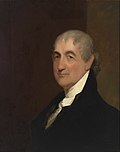| |||||||||||||||||
| |||||||||||||||||
 County results Strong: 50-60% 60–70% 70–80% Sullivan: 50–60% 60–70% 70–80% | |||||||||||||||||
| |||||||||||||||||
The 1806 Massachusetts gubernatorial election was held on April 7, 1806, in order to elect the Governor of Massachusetts. Incumbent Federalist Governor of Massachusetts Caleb Strong won re-election in a second rematch against the incumbent Democratic-Republican Attorney General of Massachusetts James Sullivan. [1] [2]


